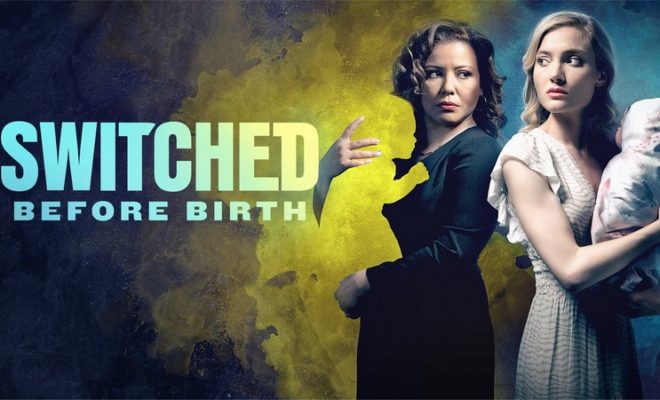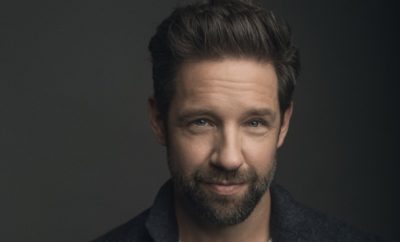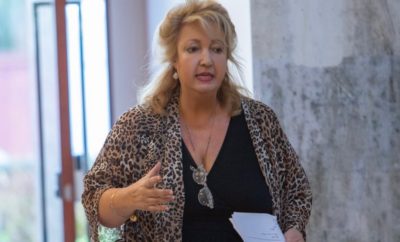
Interviews
Elisabeth Rohm, Justina Machado & Skyler Samuels – Switched Before Birth
By: Jamie Steinberg
Q) Elisabeth, my question is for you. You have taken some very big and emotional swings with your directing so far, Girl in the Basement. I remember the last one of these you talked about how emotional it was to work with the actors on that. For your second project, were you looking for something as emotional in a different way or would you have been satisfied with something like Psycho Intern, which is also in the Lifetime can?
ELISABETH ROHM: Well, to be honest I probably would have accepted any job from Lifetime. I have a deep gratitude to the network and I’m excited about developing other projects with them. Justina and I have some exciting things that we’re working on together. But I felt very privileged to be given the opportunity to direct something about IVF because I really went through my own journey, and it was painful and difficult. And these actresses really captured what is deeply personal to me and it’s like lightning in a bottle to watch these two act in this movie, so I was lucky I got a good second swing.
Q) Knowing the subject as you did personally and also having gone through the prep for the first film, did you find it –I’m using the word “easier” hesitatingly, because I’m sure subject-wise it’s not necessarily Did you find it a smoother process this time around directing for the second time?
ELISABETH ROHM: Maybe ignorance is bliss. I think the first time was a little bit easier. The second time you know all the things that are required in a different way. But I think it was easier because I had actresses that were my friends playing the lead roles and I felt really supported by them to just thrive and succeed. And it really does take a village. And, you know, I have the utmost respect for these two. So, I would say –I guess I would say it’s easier. It’s just I knew the stakes were high.
Q) Justina and Skyler, what kind of research did you do on this kind of surrogacy and the pain, both of –on both sides of the women’s viewpoints?
JUSTINA MACHADO: we all know people –we all know women. I mean, I certainly know women who have struggled with fertility, who have had to go through these cycles to try to get pregnant and the ups and the downs and all of that that comes with wanting a family. You know, it’s a very, very human story which is why I was so attracted to it. And that’s what’s so beautiful about this movie because you really get those two points of views. I mean, no one is wrong here. No one is wrong in the movie. You know, Olivia’s character is –this is what she feels, she carried this baby. My character is like this is my egg. So, no one is wrong, but we’re both so passionate, both those characters are passionate about their point of view. I was all for Anna’s point of view. I truly believe that if that were to happen to me that would be my point of view. I want my baby. So, the beauty of this is you get to see two very valid points of views.
SKYLER SAMUELS: Yeah, I completely agree with what Justina said. There is no right or wrong. It is complicated and messy. I watched it. I still don’t know, and I pray to God I’m never put in a position where I would have to choose that. But you know like Elisabeth was saying, IVF mishaps happen far too often. It’s not regulated. And the fact that anybody could be put in that position is unthinkable. And as far as research for the role, interestingly enough, I have a couple of close girlfriends who throughout 2020 had been going through some real fertility struggles. And in the pandemic of it all, you know, I think that was another tier of isolation. You know, being in a pandemic is isolating. Fertility struggles are isolating. Put those together, and it’s a really, really challenging time. And you know getting to sort of be on that journey with them trying to be supportive and trying to understand how they feel both physically and emotionally and the fact that there are things that women who go through this process can’t explain to their husbands or their partners. Like as much as they want them to know there’s something that’s happening in you that’s just so raw and confusing and complicated that it can be hard. And there was a really beautiful thing which happened which was on our first day of filming. I’m in my sort of funny pregnancy, you know, my fake pregnancy belly. And I had sent a picture to my best friend being like, you know, look who’s got the belly. And she sent me a picture with a positive pregnancy test. So, my girlfriend who had been struggling all year and had gone through this process, I found out that she got pregnant the day we started this movie. So that kind of felt like my good luck charm going into this.
Skyler cries a lot in this movie. And while I’m, you know, not a mother myself, I hope one day. I’m very familiar with what grief feels like and with loss. And I think that that is universal to all of us. So, though this movie is about motherhood, I think more than anything it’s about a sense of belonging and a sense of grief and how to sort of live with loss that you just –you can’t make sense of. And I think that’s something that everybody can relate to.
Q) Justina and for Skyler, I’m just wondering what it like is being directed by somebody who has acted as opposed to someone who’s just a technically trained And how different is it again, on top of that having a friend direct you on the project?
JUSTINA MACHADO: I don’t necessarily think you have to be an actor to be a great director, you know. But I do think that that’s a big plus. And there’s just things that they understand, actors-turned-directors. I feel like there’s an understanding with how to deal with different personalities on set–how to speak to people on set because they know how they like to be spoken to. They know how they like to be dealt with. And like the little kookiness that sometimes we as actors can have that they will understand and not think it’s a different kind of behavior. That always helps because somebody has been there. And then when you’re working with a friend, it’s just even more –you’re even more free and more vulnerable. I felt I could be freer and not be judged by certain things that I thought or was thinking, or nothing was a dumb question, or nothing was something that that they didn’t have time for. And Elisabeth and I are dear friends. I mean, we met doing “Family Pictures” a couple years ago for Lifetime. So just being able to work with somebody that I already have such a great rapport with, just made work a lot easier and fun as much as we had to cry.
ELISABETH ROHM: I was going to say.
JUSTINA MACHADO: And we got to feel like this. It was fun.
ELISABETH ROHM: No more crying. You did it perfectly. Now it’s done.
JUSTINA MACHADO: So that was my experience.
SKYLER SAMUELS: Yeah. I think there’s always a benefit having someone direct you who’s been in your shoes. But I think there’s actors-turned-directors, actors who are friends and there’s Elisabeth Rohm. Elisabeth is my biggest girl crush of all time. She knows this. I announce it wildly to the world. I met her over Zoom last year and I got off the call and I said to my reps, “Yeah, so I want to grow up to be her, so let’s figure out how we can be best friends” because I absolutely adore this woman and what she’s done. And how absolutely poised and creative and intelligent and thoughtful she is in everything that she does. No question this was some of the hardest work I think I’ve done in my career to date. This is the closest character I’ve played to myself which is a lot more challenging than I anticipated. And I don’t think I could have done the work that I did without Elisabeth. She gave me permission to take up space and be free in a way that no one has before, and it’s been a gift moving forward. I don’t know that how I feel about my job and my abilities would be the same without Elisabeth. She’s just –I don’t know she’s my acting guardian angel always. She’s a magical person.
ELISABETH ROHM: And so really, it’s a love story between these two, you know? That’s really –outside of it being like a film that’s also –Lifetime’s so good at making not just movies, but movements. This is a movement in a sense, but it’s really a love story between friends. So, the friendship between them is really felt and like they both said, navigating grief and finding each other through it all. So thanks, thanks for that, you guys.
Q) Skyler, you started to say how like playing something more towards yourself was more Can you kind of talk like expand on that? What was it that you found difficult about bringing that?
SKYLER SAMUELS: Yeah, I mean you know I’ve been very lucky that I’ve worked for many years and gotten to play many parts, you know, a lot of which have been you know sort of like supernatural or superhero and I’m kicking ass and doing all kinds of fun things. And I’ve loved those parts. They’re wonderful. But I think there’s something that when you prepare as an actor to play a role that feels like you, when I read the script, there are things that Olivia Crawford says that I’m like, “Oh god, that’s like straight out of my mouth.” Or just like the way that she moves through space, it felt like me. And I think what was both challenging and liberating about that experience was that I had to work through my own grief in real time doing this movie. That there is no barrier between sort of –the barrier between Olivia Crawford and Skyler Samuels was like paper thin. And I’m not used to being that close to the character. And I think that it made –everything emotional that happens in the movie is as real as can be.
I had to really be okay with bringing my own real-life grief and experience and struggles and triumphs and just sort of putting it all out there in a way that I haven’t had to do before. And like I just said, I couldn’t have done that without the guidance, love and support of Elisabeth Rohm and Justina. What a partner to just like let you do your thing because it’s challenging. But it’s also really liberating to be able to do that. It sort of sets a part of you free. That’s the best way I can describe it.
Justina, this is for you. You’ve been at this career a long time. And sometimes it takes that one galvanizing thing like “One Day at a Time” where things really break open and opportunities like this come your way. Is it safe to assume this is an especially sweet time for you now?
JUSTINA MACHADO: You know, it’s so bizarre because it’s so not a sweet time in the world with everything that’s happening. But it’s kind of been, you know, I’ve been okay. And I’m grateful. I’m grateful for that. And you’re absolutely right, I’ve been at it a long time. So, I’m grateful to still be here, still at it. And “One Day at a Time” did open this whole new world to me, for me. And it feels good. It feels really good to be in a place where you’re not just the person behind the camera, that people really –I mean, in front of the camera. People really want to know your opinion, you know. It’s valued what you have to say. It’s more of –it’s the most I’ve ever collaborated in my life in my career, this time in my career. So, it’s been wonderful. And these movies –this movie that we did, Elisabeth and Skyler and I, and then Elisabeth was talking about the fact that we’re also working on some other things–it’s been liberating, exciting. And yes, I’m happy because I’m getting old –so I’m happy.
ELISABETH ROHM: And everybody’s who loves you is dying for you to direct. That’s what’s going to happen next.
JUSTINA MACHADO: Exactly. I want to move to that, too. I want to direct. I want to do all these things. Yes, that’s how I feel so yes. It feels very good, Jay. Thank you, it feels good.
*CONFERENCE CALL*




You must be logged in to post a comment Login